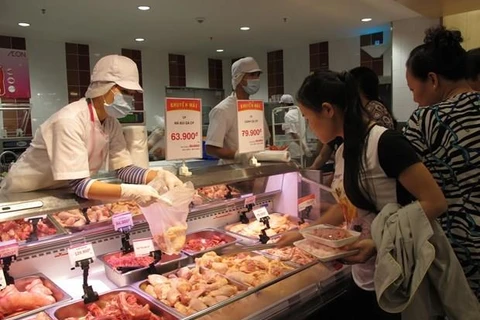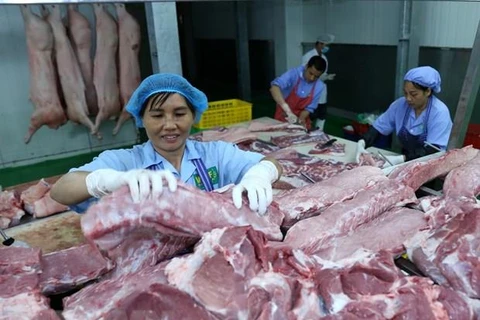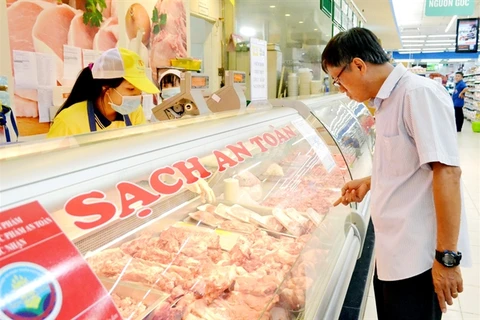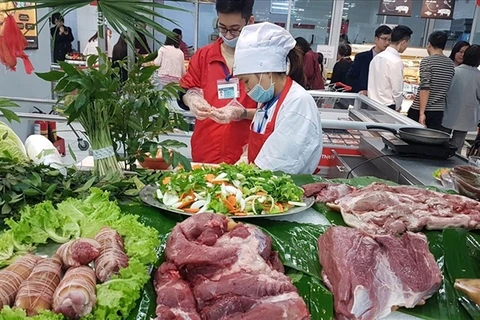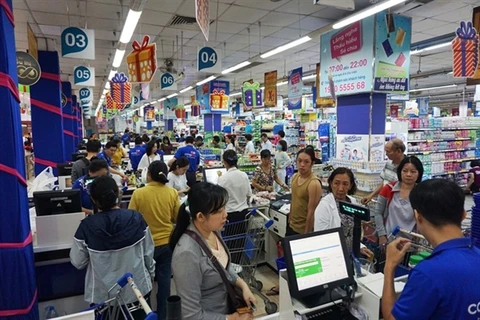Hanoi (VNA) – Deputy Prime Minister Vuong Dinh Hue stated that this year’s inflation is controllable, at 3.3 – 3.9 percent, while chairing a November 18 meeting on the recent surge in prices of pork, an essential foodstuff.
Deputy Minister of Agriculture and Rural Development Phung Duc Tien reported that from early February to November 15, African swine fever was recorded in almost 8,500 communes across the 63 provinces and cities. Up to 5.88 million pigs weighing 337,000 tonnes were culled, accounting for over 8.8 percent of the total pig weight nationwide.
Recently, average prices have reached 60,000 – 67,000 VND (2.59 – 2.89 USD), even 72,000 VND, per kg of live pigs due to supply shortage. Meanwhile, in some places, pigs are still transported to China via border crossings, he noted.
Data of the General Statistics Office (GSO) show that pork prices at present have increased by almost 19 percent from the same period last year. They now stand at 70,000 – 75,000 VND per kg in the north, even 78,000 VND in Lao Cai and Hung Yen provinces; 70,000 VND per kg in the central region; and 65,000 – 75,000 VND per kg in the south.
This office predicts that the consumer price index (CPI) in November may rise by 0.8 – 1 percent from last month, and pork price hikes will contribute 0.75 percent to the CPI expansion.
It also forecast a shortage of more than 200,000 tonnes of pork, compared to the total demand for over 600,000 tonnes, in the fourth quarter of 2019. If pork prices continue to increase by 10 – 15 percent to around 80,000 VND per kg, this year’s CPI will grow by less than 3 percent against 2018, still under the ceiling limit of 4 percent.
Meanwhile, Deputy Minister of Industry and Trade Do Thang Hai said the country is likely to experience a shortage of 70,000 – 90,000 tonnes of pork in live weight for the Lunar New Year (Tet) holiday, which falls on late January 2020.
He said relevant agencies should consider importing pork if domestic supply is insufficient, adding that this will help cool down pork prices and reduce inflation expectations.
At the meeting, Deputy PM Hue said supply shortage is obvious, noting that supply and demand must be balanced on the monthly basis. He asked the Ministry of Industry and Trade and the Ministry of Agricultural and Rural Development to consider pork import.
However, he noted, the import must ensure supply for consumers while not affecting pig farmers, and the move is just to deal with the temporary supply shortage and not a long-term activity.
Hue affirmed inflation will still be kept at 3.3 – 3.9 percent this year and that the Government will manage to ensure supply – demand balance and harmonise interests of consumers, businesses and intermediaries./.
VNA

